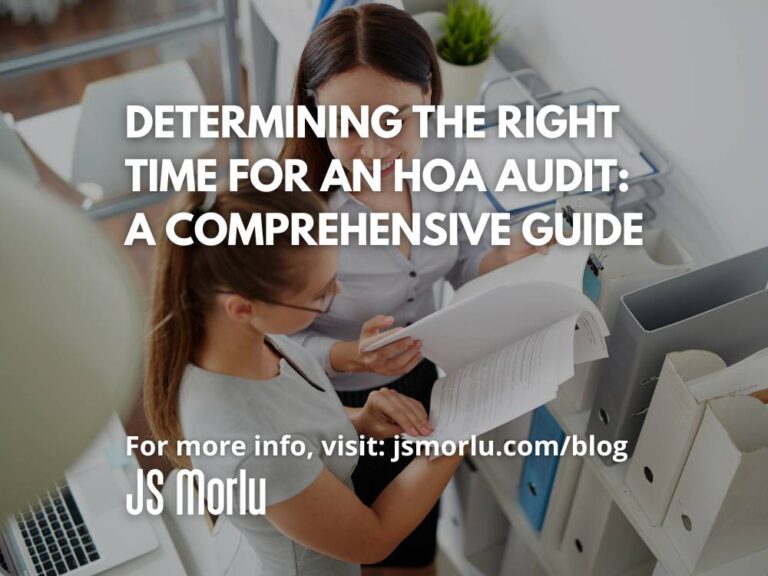The financial statements of a Homeowners’ Association (HOA) serve as a critical window into the association’s financial well-being. To safeguard against potential financial issues, mismanagement, or fraud, HOAs should contemplate an audit. Timing is key, and an audit should be considered in a variety of scenarios. Here’s an in-depth exploration of when an HOA should consider an audit:
1. When the Bylaws Require It:
The association’s governing bylaws may stipulate the mandatory conduct of an audit. Compliance with these bylaws is crucial.
2. When State Regulations Mandate It:
State laws in some jurisdictions necessitate regular financial assessments in the form of audits, reviews, or compilations. Compliance is paramount.
3. Turnover in Management Company:
A change in the management company often triggers the need for an audit to evaluate the effectiveness of internal controls. This helps ensure a seamless transition.
4. New Board Members:
When new board members assume their roles, an audit can offer them a clear financial baseline and prevent them from inheriting unresolved financial issues.
5. Suspected Financial Fraud:
If there are concerns or suspicions of financial fraud, an audit can be a critical tool to uncover irregularities and prevent further financial misconduct.
6. Windfalls or Large Payouts:
Windfalls, such as insurance payouts or construction defect settlements, may require extra scrutiny to ensure proper allocation and management of funds.
7. Unusual Reserve Activity:
When there are significant or unusual reserve or replacement fund activities, an audit can uncover the root causes and ensure the proper handling of these funds.
8. Poor Internal Control Environment:
Smaller associations or those with inexperienced management companies may suffer from poor internal controls. An audit can identify deficiencies and recommend improvements.
9. Segregation of Duties Concerns:
When a single individual is responsible for both writing and signing checks and preparing bank reconciliations, a lack of segregation of duties may warrant an audit.
10. Inadequate Accounting System:
HOAs struggling with inadequate or non-functioning accounting systems may need an audit to establish a sound financial framework.
11. Suspected Fraud or Embezzlement:
When there are suspicions of financial misconduct, it’s essential to involve a CPA and communicate the concerns to ensure a thorough investigation.
12. Internal Disputes:
In situations where there’s internal strife between board members or between the board and the management company, an audit can help resolve financial tensions.
13. Board Transitions:
An audit is prudent when the previous board resigns or is replaced, as it ensures a smooth financial handover.
14. Developer Control Transition:
As control transitions away from the developer, an audit can establish the financial independence and stability of the association.
15. Financial Challenges:
HOAs experiencing financial difficulties, regardless of the cause, can benefit from an audit to assess their financial situation and explore potential solutions.
16. Large Associations:
Larger associations with substantial assessments or significant cash on hand should consider regular audits to manage their more complex financial landscape.
In many states, HOAs are required to conduct a compilation, review, or audit on an annual basis, as specified in their bylaws. The frequency and timing of audits can vary, but the bylaws typically offer guidance on when and if an audit is necessary.
In essence, the decision to conduct an audit hinges on a multitude of factors, including legal obligations, financial circumstances, and the need to ensure transparency and accountability within the HOA. Understanding these triggers empowers HOAs to make informed decisions regarding the timing and necessity of financial assessments.
JS Morlu LLC is a top-tier accounting firm based in Woodbridge, Virginia, with a team of highly experienced and qualified CPAs and business advisors. We are dedicated to providing comprehensive accounting, tax, and business advisory services to clients throughout the Washington, D.C. Metro Area and the surrounding regions. With over a decade of experience, we have cultivated a deep understanding of our clients’ needs and aspirations. We recognize that our clients seek more than just value-added accounting services; they seek a trusted partner who can guide them towards achieving their business goals and personal financial well-being.
Talk to us || What our clients says about us


